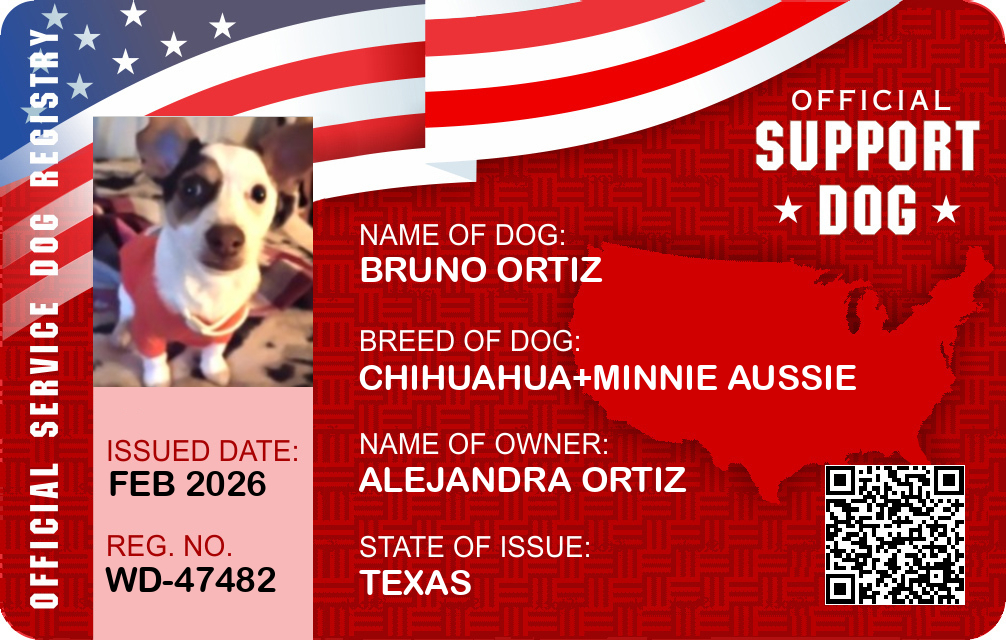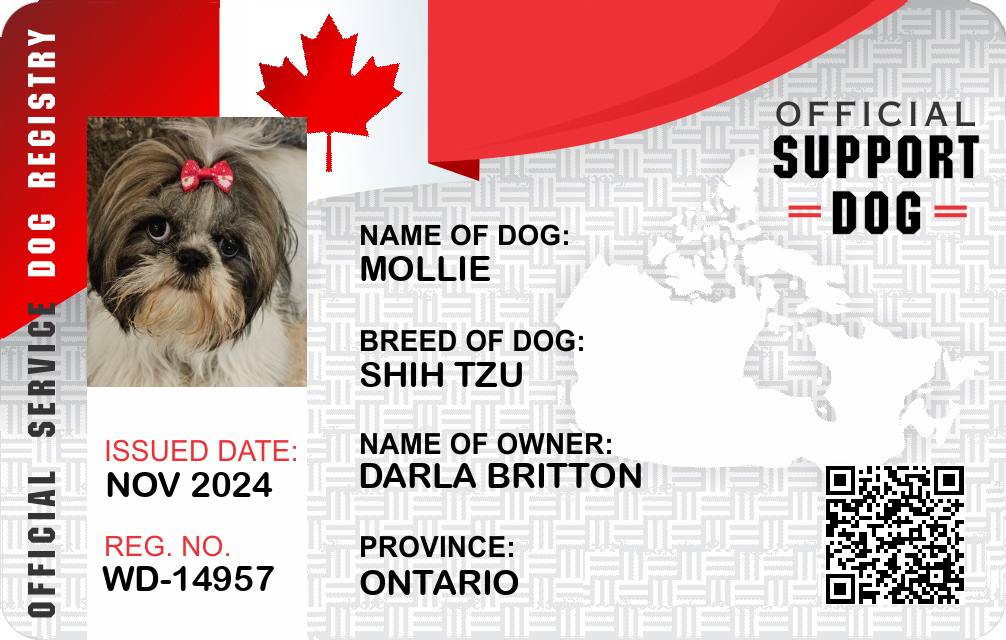Texas Emotional Support Animal Laws
Get Your Documents
Example State Cards


Overview of ESA and Legal Definitions in Texas
What is an Emotional Support Animal?
An Emotional Support Animal (ESA) is a companion animal that provides therapeutic benefits, such as alleviating symptoms of emotional or mental disabilities, solely through companionship and presence. Unlike service animals, an ESA does not require specific training to perform tasks. Instead, their primary role is to offer comfort and support to individuals suffering from conditions such as anxiety, depression, or PTSD. In Texas, ESA are recognized under various laws that provide some rights and protections primarily concerning housing and air travel.
How ESA Differ from Service Animals
Service animals are specifically trained to perform tasks for the benefit of individuals with disabilities. According to federal law, particularly the Americans with Disabilities Act (ADA), a service animal is most commonly a dog that has been trained to perform work or tasks related to the handler’s disability. In contrast, ESA do not perform any specific tasks but provide emotional support through their presence. This key difference places service animals in a distinct legal category, granting them rights to access public spaces, which is not extended to ESA.
Key Federal Laws Affecting ESA (e.g., FHA, ACAA)
Federal laws are paramount in shaping the rights granted to ESA owners. The Fair Housing Act (FHA) is crucial, as it prevents discrimination in housing against individuals who use ESA. Under the FHA, housing providers must provide reasonable accommodations to ESA owners, even in buildings with “no pets” policies. The Air Carrier Access Act (ACAA) previously allowed ESA to travel in the cabin with their handlers on flights, but recent amendments have narrowed these rights, permitting only trained service animals to do so. Despite these federal provisions, state laws like those in Texas further define and sometimes limit these federal rights.
State-Specific ESA Laws in Texas
Housing Rights and Responsibilities
In Texas, housing rights for ESA owners align closely with the federal FHA guidelines. Landlords must make reasonable accommodations for tenants with documented needs for an ESA, even in properties that generally forbid pets. However, ESA owners must provide a legitimate ESA letter from a qualified mental health professional, and landlords may request this documentation to verify the necessity of the accommodation. Despite these protections, Texas law allows landlords to deny accommodations if the ESA poses a threat to the safety or property of others.
Public Access and Accommodation
Unlike service animals, emotional support animals do not have the right to accompany their handlers in public spaces under Texas law. This means that ESA are not permitted in restaurants, stores, or other public accommodations unless the establishment grants discretionary access. Texas businesses are not obligated to accommodate ESA, as their presence is not covered under the ADA but merely suggested under a courtesy or policy-based decision.
Transportation and Travel Rules
Following federal revisions in the Air Carrier Access Act, ESA are not recognized with the same travel privileges they once were. Airlines are no longer required to accommodate ESA in the cabin, treating them under the same policies as other pets. In Texas, this means ESA owners must adhere to each airline’s specific rules for pet transport, which may include additional fees and requirements for appropriate carriers. Ground transportation entities in Texas do not legally need to recognize ESA in any special capacity, though some may offer accommodation at their discretion.
Employment and Workplace Considerations
In Texas, employment law does not provide ESA owners the right to bring their animal to work under usual circumstances. The Americans with Disabilities Act mandates reasonable accommodations for individuals with disabilities, but since ESA do not perform specific task-based functions, they do not qualify for workplace accommodations in the same manner as service animals. Employers in Texas may opt to allow ESA as part of a reasonable accommodation plan, but they are not legally mandated to do so.
Documentation, Requirements, and Processes in Texas
ESA Letters and Who Can Issue Them
To secure the rights afforded under laws protecting emotional support animals, owners must obtain a proper ESA letter. In Texas, this letter must be issued by a licensed mental health professional, some of whom include psychologists, psychiatrists, counselors, or social workers. The letter must confirm the individual’s need for the ESA due to a recognized disability and outline the benefits derived from the animal’s companionship.
Landlord, Business, and Provider Verification Rules
Landlords in Texas are allowed to verify an ESA’s legitimacy by requesting the ESA letter from the tenant. However, they cannot ask for extensive details or medical histories unrelated to the necessity of the ESA. Businesses, meanwhile, hold no obligation to verify or accommodate ESA, as mentioned previously. As for providers, conspicuous advertising or offering of fraudulent certification services can lead to both legal action and penalties under Texas law.
Rights, Limitations, and Legal Risks
Rights ESA Owners Have in Texas
ESA owners in Texas benefit primarily from protections in housing under the FHA, where they cannot be discriminated against due to an ESA necessity. They hold rights to reasonable accommodation requests in dwellings and leases, providing supportive documentation when requested by landlords, ensuring their ESA can reside with them despite typical pet restrictions.
Limits on ESA Protections and Common Restrictions
Significant limitations exist for ESA, particularly concerning public access and travel. Unlike service animals, ESA have no legal grounds for access in public spaces or non-designated animal transportation areas. Additionally, ESA owners must respect individual policies set forth by service providers and businesses, as these entities are not obligated to allow ESA.
Penalties for Fraud or Misrepresentation
Falsely representing a pet as an ESA or misrepresenting an ESA as a service animal is considered fraudulent and subject to penalties in Texas. Such actions can result in hefty fines and legal repercussions, further stressing the importance of honest and transparent representation for ESA owners.
Practical Guidance for ESA Owners in Texas
How to Qualify for an ESA Legitimately
To qualify for an ESA in Texas, individuals should first consult a licensed mental health professional capable of assessing their condition and determining the necessity of an ESA. Legitimate qualification requires acquiring an ESA letter, which documents the professional’s recommendation and outlines the therapeutic need for the animal.
How to Talk to Landlords, Airlines, and Employers
Approaching landlords, carriers, and employers about ESA should be done with a focus on clear communication and prepared documentation. ESA owners should:
- Provide valid ESA letters when requested.
- Familiarize themselves with the relevant legal protections and limitations.
- Approach conversations openly, discussing accommodation needs respectfully.
Summary of ESA Laws in Texas
ESA in Texas are mainly protected under housing laws, offering owners the right to accommodations despite “no pet” policies. However, ESA have restricted public access rights and are subject to airline-specific rules post-ACAA adjustments.
- ESA provide emotional support, unlike service animals which perform specific tasks.
- Federal laws like the FHA provide housing protections; newer ACAA rules limit air travel privileges.
- No public access rights for ESA in Texas businesses; discretionary admission applies.
- ESA letters must be issued by licensed mental health professionals.
- Misrepresentation can lead to fines and penalties. Compliance and education avoid legal issues.
Get Your Documents
Example State Cards













